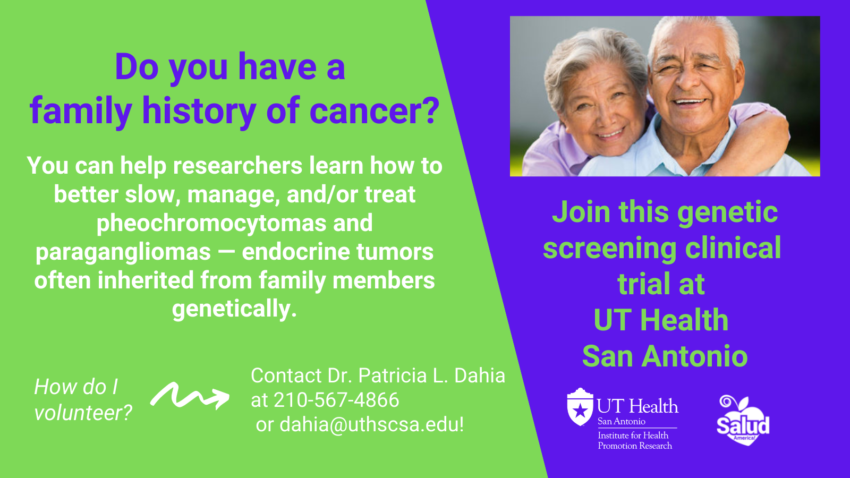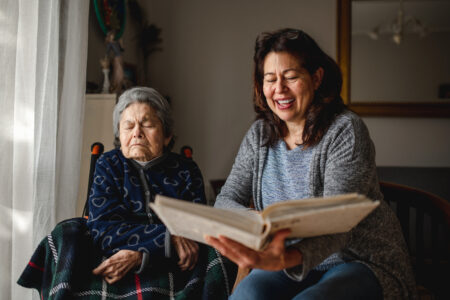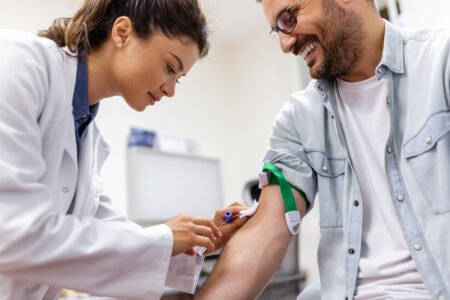
Share On Social!
While some cancers develop through unhealthy habits like smoking, others happen through genetics.
Clinical trials with volunteers who have a family history of cancer can help researchers learn how to better slow, manage, and/or treat these diseases. This can help save the lives of people whose family experiences cancer generationally.
If you have a family history of cancer, you can join a clinical trial at UT Health San Antonio that is studying pheochromocytomas and paragangliomas — endocrine tumors often inherited from family members genetically.
“A family history of endocrine tumors could mean you and your loved ones have a higher risk,” said Dr. Amelie Ramirez, director of the Institute for Health Promotion Research and the Salud America! program at UT Health San Antonio. “Your family members may share genes, habits, and environments that can affect your risk, which is why we need volunteers like you to enable researchers to help families who experience endocrine tumors.”
Join the Genetic Analysis of Pheochromocytomas, Paragangliomas, and Associated Conditions Clinical Trial at UT Health San Antonio by contacting By Patricia L. Dahia at 210-567-4866 or dahia@uthscsa.edu!
What is the Genetic Analysis of Pheochromocytomas, Paragangliomas, and Associated Conditions Clinical Trial at UT Health San Antonio?
UT Health San Antonio researchers will examine volunteers whose family has a history of pheochromocytomas and paragangliomas that lead to cancer.
They will work with affected—those who have developed cancer—and unaffected—those who did not develop cancer—members of a family.
They will collect and analyze DNA samples to discover new ways of understanding and treating these forms of cancers, which include:
- Pheochromocytoma

- Paraganglioma
- Inherited Cancer Syndrome
- Associated Conditions
- Kidney Neoplasms
- Bone Cancer
- Thyroid Neoplasms
- Other Cancer
Through genetic screening, researchers hope to identify mutations that could be responsible for tumor development.
- This process also could uncover additional potentially pathogenic genetic variants and other clinical features that might be associated with these cancers.
“Characterization of such genes can improve our understanding of the pathogenesis pheochromocytoma and paraganglioma and have an impact in diagnosis, therapeutic planning and genetic screening of relatives,” the researchers state.
Join the Genetic Analysis of Pheochromocytomas, Paragangliomas, and Associated Conditions Clinical Trial at UT Health San Antonio by contacting By Patricia L. Dahia at 210-567-4866 or dahia@uthscsa.edu!
Who Can Volunteer for the Genetic Analysis of Pheochromocytomas, Paragangliomas, and Associated Conditions Clinical Trial at UT Health San Antonio?
Individuals must have confirmed personal or family history of pheochromocytoma, paraganglioma, or associated conditions.
Relatives of patients with pheochromocytoma and/or paraganglioma are also eligible.
Researchers will accept volunteers from San Antonio, the greater United States, and also outside the United States.
Inclusion Criteria:
- Diagnosis of pheochromocytoma and or paraganglioma
- Family member with diagnosis of pheochromocytoma and or paraganglioma
- Diagnosis of a pheochromocytoma- and or paraganglioma-associated condition
- Family member with diagnosis of a pheochromocytoma- and or paraganglioma-associated condition
Exclusion Criteria:
- Unconfirmed diagnosis of pheochromocytoma and/or paraganglioma or associated condition
Join the Genetic Analysis of Pheochromocytomas, Paragangliomas, and Associated Conditions Clinical Trial at UT Health San Antonio by contacting By Patricia L. Dahia at 210-567-4866 or dahia@uthscsa.edu!
What Will Volunteers Do as Part of the Genetic Analysis of Pheochromocytomas, Paragangliomas, and Associated Conditions Clinical Trial at UT Health San Antonio?
Researchers will collect DNA samples from volunteers and their family members, including:
Samples from affected individuals will include:
- DNA from peripheral blood lymphocytes
- DNA from tumor tissue, or
- Frozen peripheral blood lymphocytes for nucleic acid purification
- Frozen tumor tissue for nucleic acid purification
- Lymphoblastoid cell lines, if available
- Buccal cells obtained by cheek swab or saliva
Samples from unaffected relatives will be obtained as:
- DNA from peripheral blood lymphocytes, or
- Frozen peripheral blood lymphocytes for nucleic acid purification
Join the Genetic Analysis of Pheochromocytomas, Paragangliomas, and Associated Conditions Clinical Trial at UT Health San Antonio by contacting By Patricia L. Dahia at 210-567-4866 or dahia@uthscsa.edu!
Contact Now to Volunteer for the Genetic Analysis of Pheochromocytomas, Paragangliomas, and Associated Conditions Clinical Trial at UT Health San Antonio!
Families with a history of genetically inherited cancers deserve to not fear for the lives of their loved ones at the hands of these disorders.
“If more people could step up to volunteer for studies such as these, headway could be made in saving the lives of countless people and their family members,” Dr. Ramirez said.
Even if this cancer doesn’t run in your family, you can volunteer for another clinical trial.
We need Latino volunteers for clinical trials because it helps researchers create treatments and solutions tailored for this population.
Just ask Alma Lopez.
Breast cancer is the top cause of death for Latinas, but Alma Lopez has been a breast cancer survivor for more than 15 years.
She believes participating in a clinical trial at UT Health San Antonio helped her get better treatment and better long-term health.
“Clinical trials are great for finding new treatments that help people,” Lopez said. “And it helps the scientists. It gives opportunity to better medication for all populations.”
Join the Genetic Analysis of Pheochromocytomas, Paragangliomas, and Associated Conditions Clinical Trial at UT Health San Antonio by contacting By Patricia L. Dahia at 210-567-4866 or dahia@uthscsa.edu!
Explore More:
Clinical TrialsBy The Numbers
142
Percent
Expected rise in Latino cancer cases in coming years



